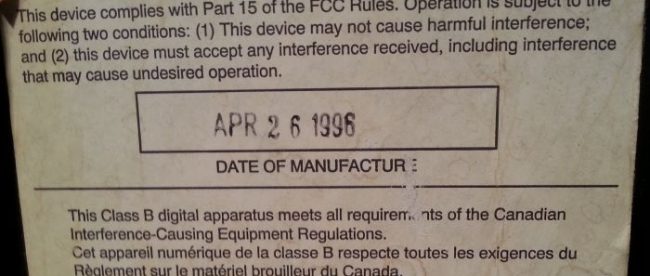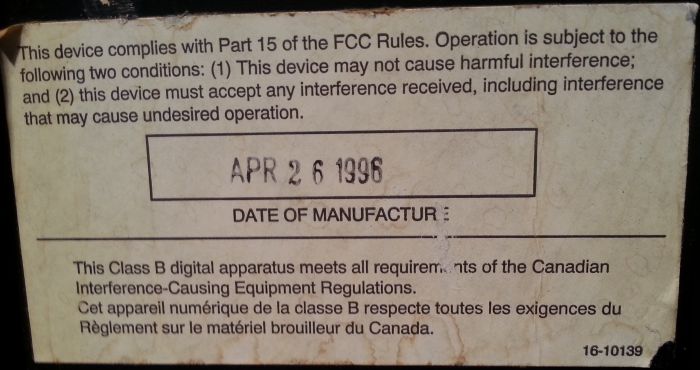The TV That Needed Help

It’s happened to us all: we turn on our television but it doesn’t seem to work. Maybe the cable is out, maybe our home Internet service is terrible and we can’t get Netflix or HBO Max to stream, or maybe the TV itself died. Either way, it’s frustrating, and may require someone to come to your home to check out what’s broken.
That’s basically what happened to an Oregon man named Chris van Rossman on October 2, 2004. He turned on his TV, something went wrong, and the next morning, people he had never met before were at his apartment to see what was going on. If you’re a typical consumer with a typical TV problem, though, you already know something’s weird about van Rossman’s story — the cable guy doesn’t show up the next day.
Another weird detail? Van Rossman didn’t even know his TV was broken. The problem was invisible — oh, and potentially a matter of national security.

Pictured above is a sticker from an old electronics device — as you can see, whatever the sticker was once on was made in April 1996. (I took the image from Google Images, so I don’t know what it’s from, sorry.) In any event, the sticker has a generic warning from the FCC — the device can’t cause any harmful interference to other devices, but if something interferes with it, so be it.
In most cases, this isn’t an issue. But van Rossman’s TV wasn’t most cases. As CBS News explains, “on the night of October 2nd, the TV began emitting the international distress signal – the 121.5 megahertz beep emitted by crashed airplanes and sinking boats.” That may not be the type of “harmful interference” the stick above is talking about, but it’s also a really bad thing. Because when something purporting to be a crashed airplane or sinking boat screams for help, officials are going to respond.
And that’s exactly what happened in van Rossman’s case. It wasn’t a TV repair person who showed up at his apartment on the morning of October 3rd. The visitors were a few Air Force officials, the local police, and the county’s search and rescue officer. Van Rossman told the press “I have a pretty spotless record, so I wasn’t overly concerned — just a little confused. The police officer asked if I was a pilot or had a boat or anything. I said no, and they moved on,” searching the rest of the apartment building. When they circled back to van Rossman’s place, though, the SOS signal stopped shortly after they knocked on his door. That’s when everyone put two-and-two together; van Rossman, being polite, turned off the TV when they knocked, and in doing so, cut off the distress call. According to the press reports, this was the first time a television ever sent out a distress call, fake or otherwise.
With the alarm identified as false, the officials moved on — but not before giving van Rossman a warning. As the Corvalis Gazette-Times reported, van Rossman was told that “he could face a $10,000 fine if he turned his TV back on,” which is a very good reason to not watch TV. And unfortunately, the television was likely beyond repair. The Gazette-Times asked Jim Swirczynski, who ran the electronic shops at two large state universities to explain:
Electronic equipment contains small crystal components called oscillators, he said. In a television, these oscillators might be half-inch pieces of quartz that have been cut in such a way that, when stimulated by an electronic current, they vibrate – or oscillate – at a specific frequency. If one of these fragile components breaks or degrades, the shape of the crystal is altered and so is the frequency it emits.
So it looked like van Rossman needed a new television, which was unfortunate for him because it was no longer under warranty. But Toshiba, the maker of van Rossman’s distressed television, got wind of the story — and they sent him a new television for free.
Bonus fact: The country of Tuvalu is a small Polynesian island (here’s a map) that is home to about 10,000 people. And it makes a good amount of money from TV — or, more accurately, from the letters “tv.” The Internet domain .tv is Tuvalu’s country code; if you want a .tv website, you need to register it with them. Tuvalu makes about $2 million a year from the domain, accounting for about 10% of the government’s annual revenue.
From the Archives: Television Dreams: How TV screws with our sleep in a strange, generational way.
